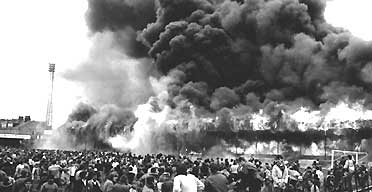
Today the BBC announced that a report that someone, from 2009 to 2012, using a government computer, had altered the Hillsborough tragedy’s Wikipedia page adding insults to it, was the BBC’s lead story.
Indeed it did seem to be so with a not inconsiderable amount of coverage for what might seem a small story in the scale of things…though naturally distressing to the families….. though the abuse was removed almost immediately from the page when posted.
The Liverpool Echo broke the story:
Exclusive: Shocking Hillsborough insults added on Wikipedia from Government computers
A series of sickening revisions to the site began on the 20th anniversary of the 1989 tragedy, when “Blame Liverpool fans” was anonymously added to the Hillsborough section of the encyclopedia site.
Computers on Whitehall’s secure intranet were used again in 2012 to change the phrase “You’ll never walk alone” to “You’ll never walk again” and later “You’ll never w*** alone.”
The words “nothing for the victims of the Heysel stadium disaster” were also added to a description of the Hillsborough memorial at the Reds’ stadium.
The BBC, as said, has been highlighting this all day. This is its web page:
Hillsborough Wikipedia posts: Government pledges ‘urgent inquiries’
I have heard only a single mention of Heysel…in a text message read out on 5 Live suggesting we don’t forget it….that suggestion didn’t spark any interest in the presenter and was indeed instantly forgotten. It was rare to hear a mention at all during the BBC’s coverage of Hillsborough recently.
Hillsborough seems to have caught the BBC’s imagination….no doubt who was in government at the time, the police mistakes and coverup, and Murdoch Sun’s infamous frontpage all contributing to it being so keen to keep this one running.
No headlines or lead story from the BBC about this…not hard to find the culprit…or which ‘government office’ seems to find it OK:

Or how about the BBC’s own involvement in a ‘disrespectful’ insult….remember ‘Ding Dong The Witch Is dead’ chart manipulation after Mrs Thatcher’s death?……..
“The BBC finds this campaign distasteful, but does not believe the record should be banned.
BBC director general Tony Hall said: “I understand the concerns about this campaign. I personally believe it is distasteful and inappropriate.
“However, I do believe it would be wrong to ban the song outright as free speech is an important principle and a ban would only give it more publicity.”
However even the Guardian thinks it may have gone too far in some of its coverage of Hillsborough:
Mix and Match of the Day turns tragedy to cliche
Adam Curtis did a brilliant piece on Charlie Brooker’s Newswipe on BBC4 last week about “Oh Dearism”, the trend for television news to show shocking events about which we can do nothing but feel helpless and sad, and to which the only possible reaction is “Oh dear”.
I wonder if anybody in BBC Sport saw it. I only ask because Saturday’s Football Focus and Match Of The Day used the 20th anniversary of the Hillsborough disaster to indulge in the kind of crass grief tourism that has become a media staple since Princess Diana’s death.
Had the coverage dealt with this issue, there might have been some point to it, but interviews with the parents of two teenage girls who died on the terraces were there merely to fill our eyes with pointless tears. It is a kind of pornography. Anybody who knows anybody who has lost a child to sudden death or can imagine what it might be like to lose one’s own knows how unspeakably sad it must be. But what can you do, other than say, “Oh dear?”
At Heysel in Belgium in 1985 (May 29) Liverpool fans caused 39 deaths and around 600 injuries…so just a reminder to put things in perspective:



Just a few days earlier on May 11 Bradford City’s stadium burst into flames…in the 5 minutes one stand took to burn to the ground 56 people died and 250 were injured despite the best efforts of police officers to rescue many stricken fans putting themselves at great risk to do so.

“All of a sudden, a sheet of flame went up to the roof and along the entire length of the stand. Within five minutes of it starting, the whole stand was burnt down. In fact, I think it was timed at 4min 35sec. The strong wind was fanning it from the end where the blaze had started.
“It didn’t receive much comment at the time, but the roof was bitumen, with slats, and as the flames ran along the top of the stand the bitumen started melting and falling on the people below. People were coming out of there with their hair and clothes singed and big drops of bitumen all over them.
The tragedy lacked both the global reach of Heysel – a European Cup final, between Liverpool and Juventus – and the outrage and sense of injustice that came with the Hillsborough disaster. Bradford was commonly regarded as a product of widespread ignorance about general safety at football grounds, and the lethal combustibility of wooden seats (there was an echo here, in wider society, with the King’s Cross fire -itself blamed on the presence of wooden escalators on the London Underground).
With Bradford there was no stampede by drunk and belligerent fans (Heysel), and no policing or stewarding issues of the sort that keeps the Hillsborough Campaign in sad and grinding motion to this day. Put the three calamities side by side and you wonder how football ever emerged from the Eighties. With so many dead in four short years, our national game had become a killing field. The Popplewell and Taylor reports into Bradford and Hillsborough, respectively, were among the most important social documents of our times.



